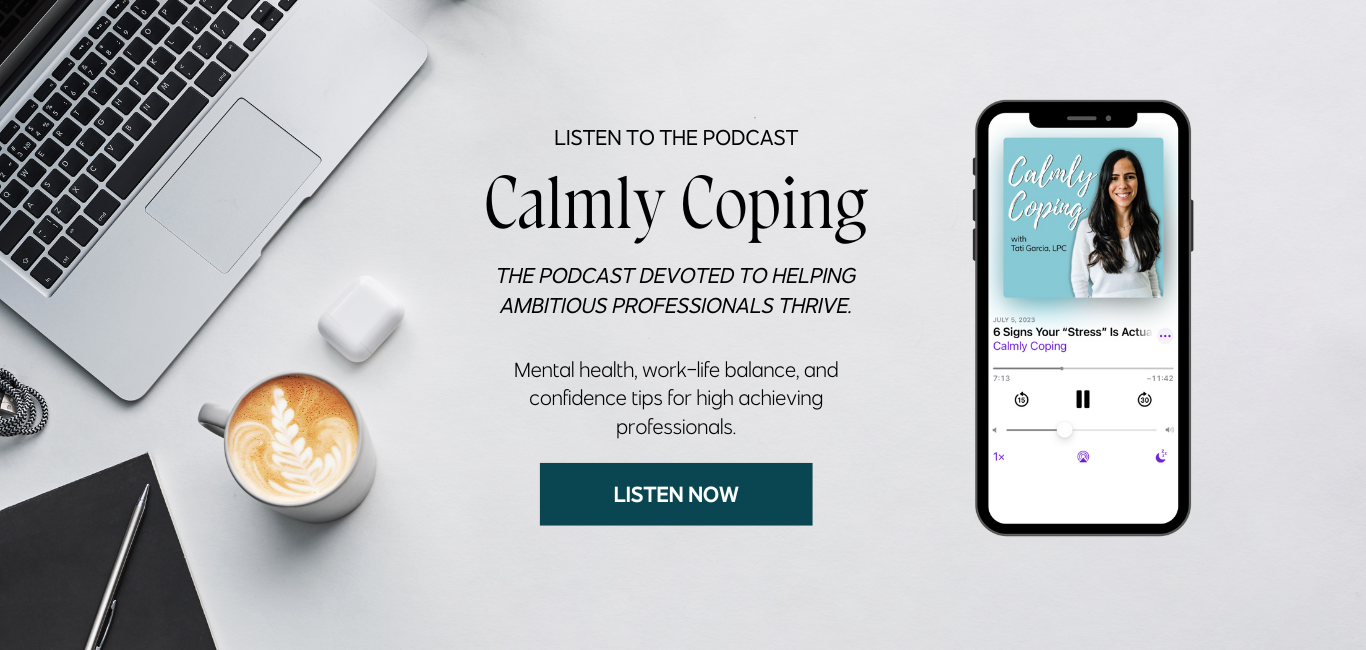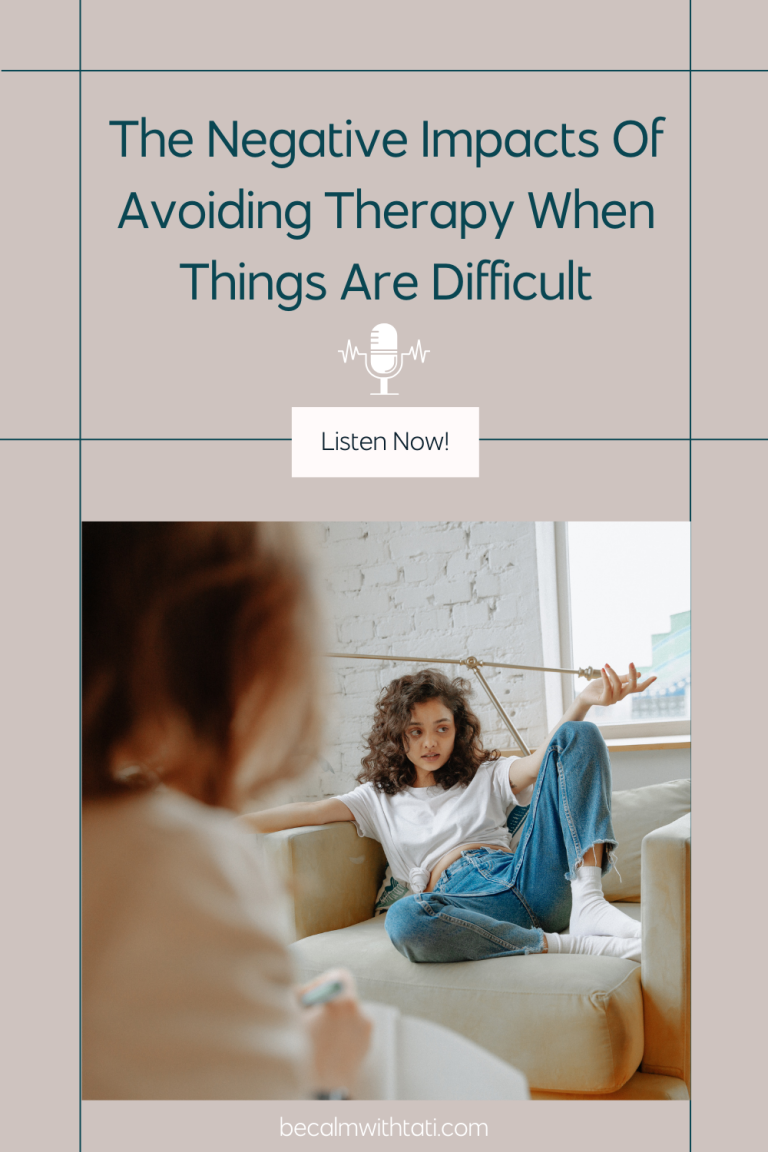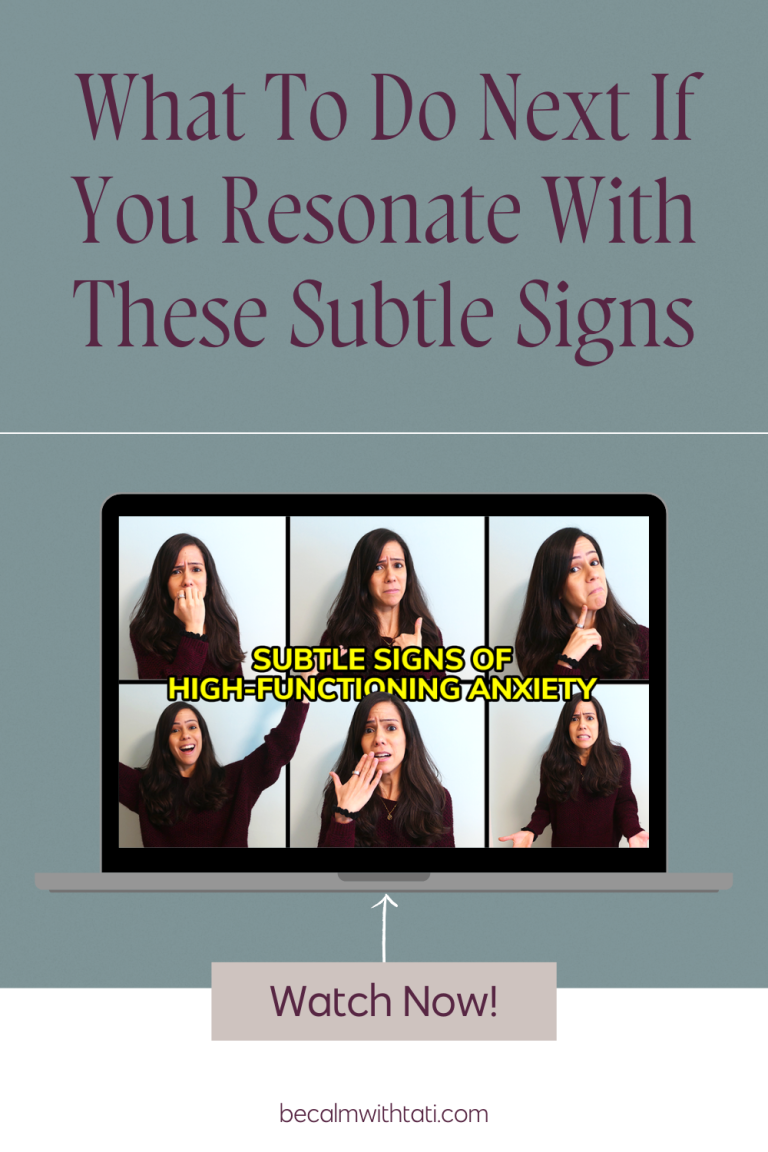Overthinking can feel like an endless loop, consuming your energy and keeping you from being fully present in your life: constantly analyzing, rehashing the past, or worrying about the future. In this episode, I’ll be sharing simple, actionable daily habits that can help you stop overthinking, regain control of your thoughts, and find more peace of mind.
In this episode, you will learn:
- How to avoid habits that fuel overthinking and replace them with grounding alternatives.
- Simple daily habits to help you stop overthinking and feel more in control of your thoughts.
- Techniques to challenge negative thinking and reduce emotional reactivity.
LISTEN NOW:
🎧 CLICK HERE TO LISTEN TO CALMLY COPING WHEREVER YOU LISTEN TO PODCASTS
WATCH NOW:
📝 Calm Your Anxious Thoughts free download: Thoughts
FREE TRAINING: Achieve A Calm Mind, Balanced Life, & Empowered Confidence in 90 Days
If you want to learn how to take back control of your life so you can feel calmer and more confident, and learn the tools to spend your time according to what matters most to you (no matter what your schedule is like right now)…

LISTEN, REVIEW, AND SUBSCRIBE TO THE PODCAST!

INTRO/OUTRO MUSIC: Rescue Me (Instrumental) by Aussens@iter (c) copyright 2018 Licensed under a Creative Commons Attribution (3.0) license. http://dig.ccmixter.org/files/tobias_weber/57990 Ft: Copperhead
DISCLAIMER: All content here is for informational purposes only. This content does not replace the professional judgment of your own mental health provider. Please consult a licensed mental health professional for all individual questions and issues.
Interested in diving deeper to get support for high-functioning anxiety?
I offer 1:1 coaching to help high-achievers overcoming high-functioning anxiety so they can feel calmer, more present, and have improved balance in their lives. Click here if you’re interested in learning more and getting started.
Calm, Balanced, & Confident is my comprehensive A→Z self-paced course to help high-achieving professionals overcome high-functioning anxiety so they can feel calmer, balanced, and more confident without the anxiety and overwhelm. Click here to learn more and enroll today.
Looking for ongoing support and guidance with high-functioning anxiety? The Calm & Ambitious Community is the exclusive community for high achievers with high-functioning anxiety. Click here to learn more and join us today!
TRANSCRIPT:
Click to view the episode transcript.
Overthinking can feel like an endless loop, consuming your energy and keeping you from feeling fully present in your life, constantly analyzing, rehashing the past, and worrying about the future. Today I’ll be sharing simple, actionable daily habits that can help you stop overthinking, regain control over your thoughts, and find more peace of mind.
Welcome to Calmly Coping, the podcast for high achievers who want to feel calm, balanced, and confident from within. I’m Tati, a therapist and coach, and I’m here to help you stop overthinking, stop overworking, and crush self doubt. Every other week, I share actionable tips and strategies you can implement right away to create more balance and ease in your life.
Thanks so much for tuning in. Let’s get started. I want to start this episode with a few quotes that I compiled about thinking. So first by Buddha, we are what we think. All that we are arises with our thoughts. Marcus Aurelius, the things you think about determine the quality of your mind. Your soul takes on the color of your thoughts.
In William Shakespeare, there is nothing either good or bad, but thinking makes it so. The way that we think affects the way that we view the world around us, and it affects the judgments that we have, whether those are positive or negative. So if you are engaging in a lot of negative thoughts, which overthinking tends to be, then that’s going to affect the way you view the world, your perception, and the way that you feel.
So when we can start to become more aware of our thoughts and change our relationship to them, then that can help us to stop overthinking and getting stuck in those endless spirals of spinning on different things. First, I’m going to be sharing some habits to avoid so that you can prevent overthinking, and then I’m going to share habits to engage in. Now, of course, you don’t have to do all of these habits that I share every single day. This is more a menu of options for you to choose from and experiment with to determine what works best for you. So first habit to avoid is rumination. So this might seem kind of obvious, like rumination is overthinking.
Obviously that’s what you’re trying to avoid. However, A lot of times we might not even recognize when we’re caught in habits of rumination of overthinking. And so when you can catch yourself and notice those moments and say, Oh man, I can’t stop overthinking this thing. That is an opportunity for you to make a change as an opportunity for you to pause.
And I recommend doing this by getting into your body, which will allow you to get out of your head. So this can be an opportunity for you to do something different. If you’re finding that you’re staying up at night, you know, endlessly thinking about thoughts that are negative and worrying about things, or if you are overthinking a decision, try and do something different.
So that can be taking some deep breathes. breaths, doing a guided meditation, stretching, yoga, going for a walk, anything that’s going to get you into a physical place so that you can get that energy and focus out of your head into your body. So one example could be, let’s say you received critical feedback on a presentation that you did.
So rather than endlessly spinning on this feedback, maybe you can take a short walk or engage in a guided meditation. to ground yourself and break that cycle of negative thinking. The next habit that you want to avoid is numbing behaviors. And so when I say numbing behaviors, these are things that you’re engaging in to basically numb your emotions as a way of avoiding how you’re feeling.
This can look like doom scrolling on your phone. It can look like endlessly binge watching TV shows. It can look like overeating. And even when you’re not hungry, like emotional eating, It can look like zoning out with video games or anything else. that not necessarily something that is you’re enjoying it, but it’s just something that you’re doing because you want to avoid thinking about whatever is bothering you.
Now there are healthy distractions that you can engage in, but when you’re numbing and constantly avoiding and engaging in these habits, then that’s going to get you further into overthinking because that avoidance is going to actually fuel the overthinking mind. Instead of binge watching a show after a long day, and not to say that these things are terrible to do, but within reason, keeping in mind how you feel when you’re doing certain things, but maybe you might want to go to a yoga class or call a friend or a mentor to speak to and, you know, get off what’s on your mind.
Now I’m going to share habits that I recommend engaging in, in order to stop overthinking. First are digital habits. Now these may seem unrelated to overthinking, but nowadays our phones are such a huge part of our lives and things that we are often not without. And so it kind of has become an extension of ourselves and we’re getting exposed to different messages, different content, and different triggers.
that come from our phone which is then going to affect the way that you’re feeling and influence your thoughts. So some suggestions that I have would be to start the day phone free if you can for even 20 minutes or a half hour and that can help you to start your day without inputs that could potentially trigger overthinking.
If you’re the kind of person who tends to check your email first thing or go on social media, those things, you might feel as though you’re being productive if you’re checking email or checking in on messages, but those things can also potentially be stressful and triggering. And that’s the first thing you’re putting in your mind when you wake up, it can be important to take time for yourself.
To take things slow and enjoy a morning cup of coffee or a meal with a loved one or going for a walk or doing whatever exercise you like to engage in or doing a guided meditation, any of those things can be helpful to replace that screen time with. Another suggestion is to turn off unnecessary phone notifications.
That’s because every time a notification comes in, it can potentially trigger stress and overthinking. Maybe it can trigger comparisonitis if it’s a social media notification, or maybe it can trigger worry about other things. You know, I haven’t responded to this person in time and now I’m stressing about what to say and how to respond to them.
So it’s not to say that you need to turn off all notifications, but I say unnecessary. So do you really need a notification for every single email that comes in or for getting a like on a social media post? Those things probably aren’t essential. And if it’s something that’s required by your job that you need to be notified of certain things, that is something that maybe you can set boundaries around.
So let’s say if you need to be responding to emails during your working hours, and then maybe you want to set a screen time limit so that you’re not accessing that app outside of your working hours, but basically setting up your devices so that they are serving you rather than stressing and triggering you and potentially leading to more overthinking.
Another daily habit is one that you’ve probably heard a million times before, but it is meditation, specifically mindfulness meditation. This is super important because when I talked about that tip before of avoiding rumination, meditation is one of those skills and tools that will help you to get out of and catch yourself in those patterns of rumination.
So meditation is essentially a practice, was specifically with mindfulness meditation, where you are becoming nonjudgmentally aware in the present moment. And oftentimes this occurs through having a specific focus, whether it is your breath or whether it is sensations in your body or any other sort of focus.
And now as thoughts come up, you notice them and then bring your focus back to whatever your attention was focused on for the meditation. So maybe that would be your breath. One thing that can help is imagining your thoughts as leaves flowing down a stream or clouds floating in the sky. And this allows us to notice those thoughts, so we’re not avoiding them, but we are also not getting caught up in them.
And a daily or regular meditation practice is the tool, one of the meditation teachers that I follow calls it like a bicep curl for the brain. It’s a way of utilizing that muscle of noticing your thoughts without getting caught up in them. And this also helps to reduce emotional reactivity, rewires your brain to think differently, and changes your relationship with your thoughts.
So that rather than getting caught up in them, you can observe them and then make choices rather than feeling like these thoughts are factual or things that you need to kind of follow down the rabbit hole. One of the apps that I use pretty much daily and recommend is the mindfulness.com app. I have a link in the description or the show notes.
That you can check out if you’re interested in this app as well. The reason why I like it is because they give you a daily meditation rather than the information overwhelm of having to then go on a meditation app and have tons of options to choose from. That decision is made for you and it’s usually really helpful.
So some ways that you can use meditation are adding it to your morning routine or even if you have a stressful meeting or something coming up before you head in, doing a quick five minute meditation to help you to focus on your breath, be more aware and potentially calm your mind so that this can help to prime you for being more calm and less reactive during this meeting.
My next tip is something you’ve probably also heard of before, and that is journaling. And one effective way of journaling to reduce overthinking is essentially doing a brain dump of your thoughts, everything that’s on your mind, what you’re feeling, if you’re worried about something or anything else that might be coming up, and then challenging these thoughts and questioning, is this way of thinking helping me?
Is this way of thinking true? Is it a fact? And also recognizing how do these thoughts make you feel? So for example, let’s say you have a tough client call, maybe journaling can help you to process your frustration and challenge thoughts like, I always mess up client calls and reframe it to that call didn’t go as planned, but I can prepare differently next time and learn from this.
And this can help to break the cycle of overthinking. And keep in mind, this is something that takes time and consistency. Any of these practices don’t happen overnight, but this one in of itself is a really effective in the moment tool that can really shift how you’re thinking and feeling about things.
I actually have a free download to help you calm anxious thoughts that guides you through a quick five minute exercise to challenge overthinking. You can download that for free by going to calmlycoping.com/thoughts. Now my next daily habits are to inject positivity into the way that you’re thinking.
Because overthinking tends to be focused on negative thoughts, then we need to intentionally create positive thoughts often. Because as humans, we have a negativity bias, which means that that makes us more sensitive to negative ways of thinking. And that is because that helps us to survive.
However, it’s not something that’s helpful to make us feel happy. And so we can oftentimes need to intentionally focus on and shift that perspective to the positive so that we can then change the way we’re feeling and change our perception of things. So one simple way of doing that is through a gratitude practice.
And the reason why this can help to reduce overthinking is because this shifts your focus. to a different way of viewing things from that negative way that you might be used to. So this can be as simple as holding up three fingers and naming three things that you’re grateful for daily. An important part of this practice is actually feeling those feelings that come up when you practice this.
So rather than just kind of like, saying, Oh, I’m grateful for my family, my home, my job, and going through the motions, actually really experiencing what that feels like and thinking of your family and how that makes you feel that you have them thinking of your home, thinking of your job, or it can be the small daily things that you’re grateful for, such as a warm cup of coffee in the morning, or the birds chirping outside of your window, anything that helps you to feel present and that you are grateful for in life.
And this can apply to any sort of situation. So maybe you experienced a setback at work and rather than focusing on that, let’s say like missing a deadline, practicing gratitude helps you to redirect your focus to maybe the colleagues who helped you or what you learned from that experience. And my next habit to help stop overthinking is practicing compassion for yourself and for others.
Especially if you tend to be harsh and critical towards yourself and potentially then also towards others. So maybe you have high expectations for yourself and others or tend to be a perfectionist. This can really get to you. get you fueled in this cycle of overthinking, maybe procrastination and compassion is an excellent antidote to this.
And this can include a self compassion practice. And that includes being kind to yourself, speaking to yourself like you would a friend and being really understanding and considerate towards difficulties you might be experiencing and acknowledging those and a way that you can practice compassion for others is by being understanding towards others. Maybe not taking everything as personally and recognizing that everybody is going through their own struggles and has different things going on and maybe you’re overthinking that something that a person said is really hurtful or maybe you’re overthinking that they didn’t respond to a text message you sent or something like that and you’re spending on that in your mind, whereas It’s something that is completely unrelated to you.
It’s not personal and there could be a million other explanations for it. And practicing compassion can help us to understand that everybody has their own things going on. And most things aren’t personal. A practical way to do this is through a practice called loving kindness meditation. And this is essentially a practice that walks you through showing compassion for yourself and compassion for others.
And I think it’s a really effective practice to help to build that muscle. And my next tip is to allow your mind time to wander. This is giving your brain input free time to process and recharge without, you know, let’s say if you tend to go for a walk and listen to a podcast, maybe going for a walk, your regular daily walk or a walk in nature and leaving those things behind, or just being present with where you are.
This is important because our mind needs time sometimes to go through and process. Process and reflect on what’s happened during the day. And this is a normal part of being human. But if you don’t allow your mind time to do that, then that’s when it can kind of like pile up and then overthinking happens and it can feel really overwhelming.
So if you allow yourself small pockets of time for this during the day, and that can just be a cup of tea and looking out the window or going for a walk without any inputs or being present with a pet and petting them and just allowing your mind to do what it wants or anything else that’s enjoyable for you, then these little moments of time oh, another one is maybe going for a drive and not listening to the radio or music these little moments of time, then allow your brain to do what it needs to do and This can be a practice where you also notice, okay, if there’s overthinking that comes up, maybe I can pause that and shift my mindset to something else.
So that’s an important caveat here to ensure that you’re maintaining that balance between mind wandering and not getting caught up in negative overthinking things. So I suggest that you pick one of these habits and try them out this week and see what you notice and if you’re interested in downloading that free spreadsheet to help you to challenge your anxious thoughts, be sure to go to calmlycoping.com/thoughts. If you have any suggestions for habits that help you to stop overthinking, then please leave them in the comments if you’re watching on YouTube or if you are listening on Spotify. While you wait for next week’s episode, I have other episodes about calming your mind, improving work-life balance, and feeling more confident from within.
Thank you so much for tuning in, and until next time, be calm. Thanks so much for listening. If you like what you heard, please share this episode with a friend and please subscribe and leave me a review on iTunes. Also, remember to check me out online at CalmlyCoping. com and connect with me on Instagram at TatianaGLPC.
All content here is for informational purposes only. This content does not replace the professional judgment of your own mental health provider. Please consult a licensed mental health professional for all individual questions and issues. Till next time, I’m Tati, and this has been Calmly Coping.


Until next time…













